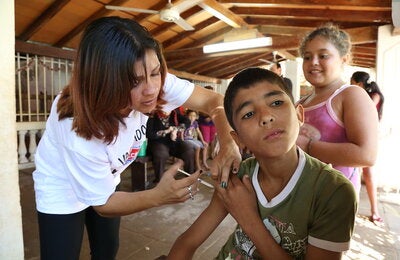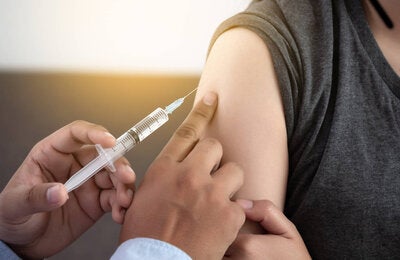
![]() Leading officials from the World Health Organization (WHO), UNICEF and the World Bank will join global leaders in health policy from the GAVI Alliance, the CDC, the Bill & Melinda Gates Foundation and the USAID at a press briefing to release a major report on progress in vaccine science and in immunizing the world's children.
Leading officials from the World Health Organization (WHO), UNICEF and the World Bank will join global leaders in health policy from the GAVI Alliance, the CDC, the Bill & Melinda Gates Foundation and the USAID at a press briefing to release a major report on progress in vaccine science and in immunizing the world's children.
WORLD HEALTH ORGANIZATION
UNICEF
THE WORLD BANK
Briefing: State of the World's Vaccines and Immunization
Leading Experts to Report on Progress, Continuing Challenges in Vaccine Science, Status of Efforts to Deliver Life-Saving Interventions to Children Most in Need
Wednesday, October 21, 2009 — Washington, D.C.
Immunization is one of the most effective and successful health interventions. It prevents illness and disability, and saves millions of lives every year. Vaccines have the power not only to save lives, but to transform them—giving children a chance to grow up healthy, go to school, and improve their life prospects, whether they live in rich or poor countries.
Since 2000, efforts have been scaled up to immunize more children than ever before, and more vaccines in greater numbers are being made available to protect children and adults. Yet significant barriers remain in delivering the benefits of science to the people who bear the greatest burden of disease.
Leading officials from the World Health Organization (WHO), UNICEF and the World Bank will join global leaders in health policy from the GAVI Alliance, the US Centers for Disease Control and Prevention (CDC), the Bill & Melinda Gates Foundation and the United States Agency for International Development (USAID) at a press briefing to release a major report on progress in vaccine science and in immunizing the world's children, and to detail the remaining scientific, logistical and economic obstacles that must be overcome to expand current programs and to provide another 24 million children with the protection of new and existing life-saving technologies.
Presenters:
Daisy Mafubelu, Assistant Director-General of Family and Community Health, WHO, will discuss progress made to date, the promise of new vaccines, and the growing role of emerging market nations as suppliers of vaccines.
Saad Houry, Deputy Executive Director, UNICEF, will discuss success on the ground, and remaining scientific and logistical hurdles faced by those seeking to boost immunization rates in the world's poorest nations.
Joy Phumaphi, Vice President for Human Development, World Bank Group, will discuss innovative financing, and the funding gap that must be bridged to save the lives of the hardest-to-reach population of children in remote areas and in regions where war or civil unrest block access to them.
Fred Were, MD, National Chairman of the Kenya Paediatric Association, will discuss the situation in Africa through the eyes of a practicing physician.
WHEN: Wednesday, October 21, 2009
9:30 a.m. — 11:00 a.m. EDT; 1:30-3:00 p.m. GMT
(breakfast at 9 a.m. EDT)
WHERE: National Press Club, Holeman Lounge
529 14th Street NW, Washington, DC, 13th floor
Metro: Metro Center, 13th St Exit (Blue, Red and Orange Lines)
RSVP: RSVP to attend this event online or RSVP to:
Katy Lenard at klenard@burnesscommunications.com
or +1 (301) 652-1558
FOR MORE INFORMATION, PLEASE CONTACT:
World Health Organization (WHO): Melinda Henry, Information Officer, at +41 (22) 791 2535 or Simon Wreford-Howard, External Relations Officer, at +41 (22) 791 1069
UNICEF: Christian Moen, Communication Specialist, at +1 (212) 326-7516 (office) or
+1 (917) 299-1041 (mobile)
The World Bank: Carolyn Reynolds Mandell, Human Development Network, at +1 (202) 473-0049 (office) or +1 (202) 294-5542 (mobile)
Pan American Health Organization (PAHO): Daniel Epstein, Information Officer, at +1 (202) 974-3459 (office) or
+1 (202) 316-5679 (mobile)



